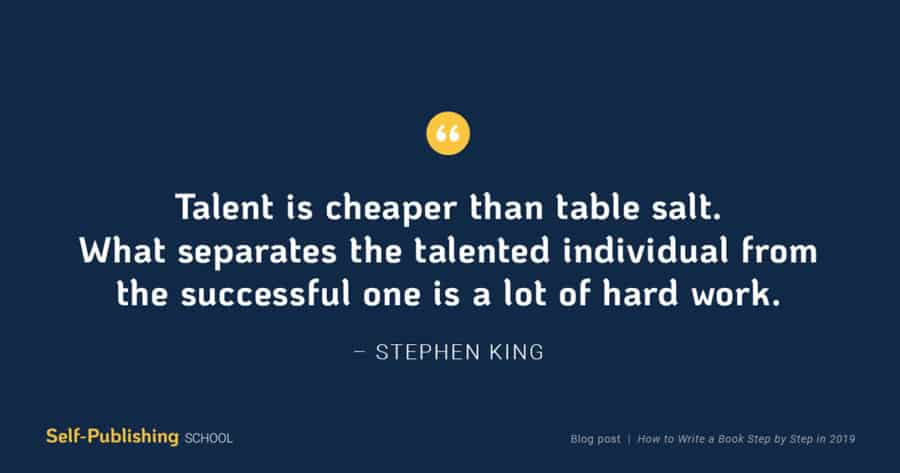
So don’t ever let yourself feel silly or start to judge yourself—doing so is a surefire way to stop your creativity in its tracks.
You can solicit reviews, but they cannot be “incentivized” reviews.
A draft is a work-in-progress, and the goal is simply to get it on paper. A draft will have mistakes and that’s okay—that’s what the self-editing process is for.
Reviews are a fantastic form of social proof. They’re a credibility sign that lots of people have read your book and loved it—and that makes other people more likely to want to read it, too.
Google Docs

When you are ready to edit your book, check out this advice from writing coach and editor Tiffany Hawk.
Ready to get started as a serious writer right now? Check out your free training below before reading the rest of this post!
Before you can start typing, you need to have a topic. That might seem obvious, but it can still be a stumbling block if you don’t know what to write about.
Would you try to construct a piece of furniture without a hammer, nails, or wood?

Taking a break is necessary for recuperating and refueling your creative tank. It’s also necessary for giving your brain some distance from the story. After you’ve taken a few weeks away from your novel, you’ll have a fresh perspective on it. Then, you’ll be able to revise it with more objectivity and more clarity.
For instance, you could think your first draft should be 75,000 words. If you want to finish it in three months, you will have to write about 825 words a day to finish in that time frame.
“When you write a story, you’re telling yourself the story… When you rewrite, your main job is taking out all the things that are not the story.” – Stephen King
Now that you have a full picture of the story and the work that you need to do, it’s time to roll up your sleeves and get to work. On the first revision, focus on bigger fixes that affect the entire plot or character arc. Wait on smaller fixes like word choice or sentence structure. This will keep the process from feeling too overwhelming. It will also help you focus on where you spend your revising time.
6. Read through your first draft without editing
Many people believe that learning how to write a book requires a lot of schooling and raw talent. But that’s not true. Plenty of famous, successful writers don’t have master’s degrees in creative writing. Many new fiction writers have no prior experience in writing or publishing a book. There are only two things you need to write a book successfully: inspiration and determination.
This is where, as Stephen King puts it, you must “kill your darlings”.
Once you’ve given yourself some distance away from the novel, it’s time to read back through your first draft. During this initial read-through, try your hardest not to edit anything you’ve written. Read what you have, absorb, think about the story as objectively and critically as you can. Take lots of notes about what you would like to change and get to the end.
Answering these questions will help you figure out what you can improve in the second draft.

- Which one can you finish the fastest? Usually, this is the topic where you have the most experience. This is a good thing to keep in mind because the faster you can finish your book, the faster you can get it out in the world where it can earn you money and help people. (And the faster you can get started on your second book!)
- Which one are you most likely to finish? Usually, these are the topics you are more passionate about. For your first book, I highly recommend choosing a topic that you’re really passionate about to help make sure that you’ll remain interested throughout the entire process.
- Which one is going to make you happy? This is a little harder to define, but it might be something that strikes a chord with you. Maybe there’s a certain book topic that stands out for one reason or another. If that’s the case, then go for it! Remember, writing should make you
Because I sought out a mentor. Someone to teach me a proven book-writing process that had been tried and tested. A book-writing system that was almost guaranteed to work, as long as I followed it properly.
You stare at a blank page for 5 minutes, but it feels like hours. To combat the boredom, you stand, stretch, and brew yet another pot of coffee.
Once your chapter outline is complete, the next steps are:
Notice that I highlighted the question, “What do you get paid for? What’s your expertise?”

The most important words of your book are the ones that appear on the outside cover:
Usually, when this sort of thing happens, it becomes very difficult to do any more writing. Why? Because writing and editing use different parts of your brains—and when you allow yourself to slip into a more critical/judgmental frame of mind, it becomes almost impossible to start creating again.
Start your BookMap by writing your intended topic in the center. From there, answer the questions and add as many related ideas as you can think of. (Again, connect related ideas with a line.) The BookMap gives you the benefits of writing in free-form and creating structure from all the connections you make.
- Speak your first draft aloud into a recording app or device such as Voice Memos or Audacity.
- Get that audio file transcribed using a transcription service like Rev.
- Read through the transcription and revise/polish it up.

Second of all, writing a book description requires a different skill set. You need to think like a copywriter to truly master book blurbs. You have to grab their attention, generate their interest, elicit their desire, and then inspire them to act. That’s a shift from storytelling.
For some writers, 250 words aren't enough. So they just ignore it and write more. And for book covers, they may use a super-small font to fit all of their words.
“Plus don't miss The One and Only Bob, Katherine Applegate's return to the world of Ivan, Bob, and Ruby!”
After writing 100,000+ words, 250 seems like nothing. But it's everything at the same time. Every single syllable in your book description matters because people can stop reading the description at any time. If your word choice is off, if they've lost the excitement, if your description turns generic and formulaic, if your writing is unclear, or if you write too much in your description…you will lose your potential reader.
Why is Writing a Book Description So Hard?

“A Navy SEAL has nothing left to live for and everything to kill for after he discovers that the American government is behind the deaths of his team in this ripped-from-the-headlines political thriller.”
Is this book part of a series? Let the reader know. Some readers prefer series and are more likely to purchase a book if they know that there's more to come. This is especially true if they like the premise of your book and your writing style (which they can glean from the first couple of paragraphs).
Your first sentence should hook them, and your last sentence should leave them teetering on the edge. If they make it to the end of your book description, they should have an overwhelming urge to buy it to find out what happens next.
![]()
Your story will not jump out of that blank page on a bright sunny day and say, “Hey, I am ready to be published!”
Then, with some basic math and a calendar (I use Google’s), you can work out how long writing the first draft of your book will take and set yourself a deadline.
Anyone can write a book. And, thanks to self-publishing platforms, anyone can publish their work too. On the other hand, if you wait until you find a publisher before starting your book, you risk not writing much at all. Plus, you'll put off gaining the practice and experience of a creative who works consistently.
The main lesson is to have some sort of system for storing and arranging each book idea in one place.
3. Before Editing Your Book, Let It Sit
You must write every day and sacrifice other pursuits or rearrange your day so you can put writing a book first. When I wrote my first book, I gave up playing Call of Duty and Halo because I didn’t have the time to write and play games.
One of the biggest tips I can give you for writing your first book is to track your daily word count and how long you spend writing each day.
- What am I trying to say?
- Who or what is the subject of my book?
- From what point of view is my book?
- What is the core value underpinning my book?
- How is my book different from everything else that’s out there?
Most people forget to mention how lonely the writing process feels. Authors spend hours researching, revising and sitting alone in a room with only words and ideas for company.
